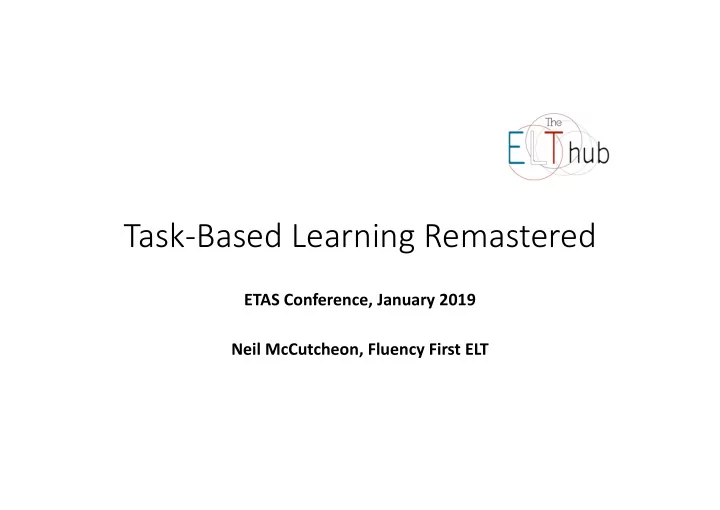

Task-Based Learning Remastered ETAS Conference, January 2019 Neil McCutcheon, Fluency First ELT
“Some experienced teachers are used to…. controlling learner language in order to avoid mistakes. TBLT requires a willingness to surrender some of that control.” (Dave Willis)
Teaching does not cause learning • Interlanguage (Selinker, 1972) • Acquisition order / “natural order” • The role of implicit learning, the “default mechanism” (Long, 2015)
Task 1 Black Mirror
Some important things • Motivation • Meaning first • Communicative use • Exposure to a range of language • Lexical chunks • Instruction (clarification, FonF)
Nation’s prescription: 1. meaning-focused input 25% Nation’s 4 strands: 2. meaning-focused output 25% 3. fluency 25% … 25% 25% meaning-focused input meaning-focused output fluency instruction 25% 25% 4. … and instruction! 25% (I.S.P. Nation, 2013)
What’s wrong with “present > practise”? • Emphasis on explicit instruction: learning language in order to use it • It promotes conformity in the classroom • There’s not enough communication (accuracy first) • Grammar McNuggets • Can be demotivating
Task 2 Home exchange
When did you have the chance to: • express your own meanings? • negotiate meaning? • learn incidentally? • focus on the language you wanted? • focus on form explicitly?
Stage by stage: what happens? • Pre-task stage (priming) • During the task • Preparing the “report” • Post-task • Task Repetition
First steps • YOU are (almost certainly) already doing some TBLT • Teachers adapt to their own circumstances / Needs Analysis • Skills lessons
Create a task • “So if you wanted to practise present perfect, ask ss individually to think, and write down 5 things they've done this week, as a list. Then with partner, ask Qs to find things you've done that they haven’t…” (from a Twitter post on favourite speaking activities)
Introducing the Band • MTV-style interviews • Put the band together • “Bands” and interviewers prepare key details: how they met, tours, releases, plans • Run (and record) the interviews
Which language items would you focus on? • present perfect and progressive tenses, contrasted with the past • Time adverbials • for & since • Question forms, and short answers (ellipsis) • Spoken discourse: “Seriously?” “How cool is that?” (task repetition: interviewing a babysitter, a house-sitter, a new flatmate for a shared house)
TBLT and DOGME • Fluency first / conversation-driven • Focus on “emergent” language • TBLT makes more use of texts • TBLT adds the “architecture” • “focused tasks” to align with the syllabus
Activities for Task-Based Leaning (Delta Publishing / Klett) by Neil Anderson and Neil McCutcheon (2019) Fluency First website: www.fluencyfirstelt.com
neil.mccutcheon@theelthub.com @NeilJMcCutcheon (Twitter)
Recommend
More recommend